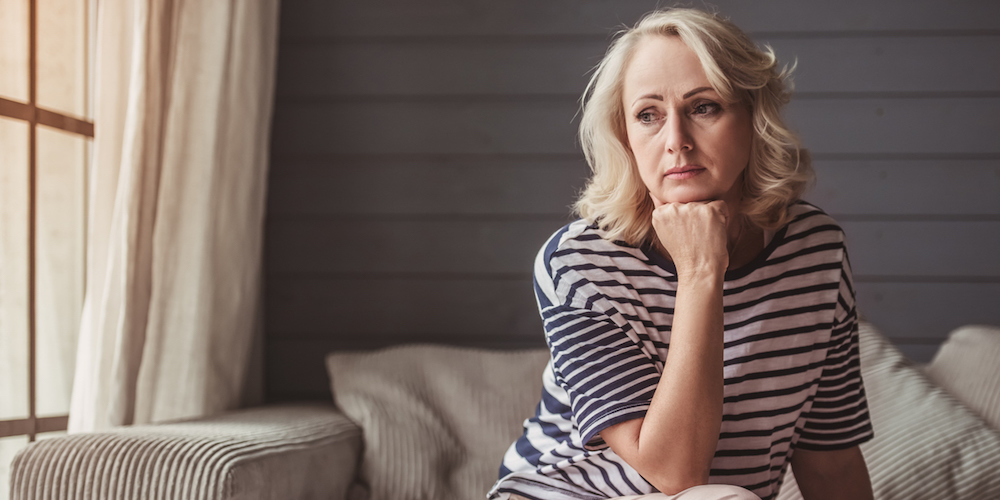If this is ringing bells for you, it might help you to know you are absolutely not the only one – far from it. In Australia and New Zealand, on average one in three women and one in five men will experience anxiety at some stage in their lives. It is the most common mental health condition in both countries.
Fed up with being told to “just stop worrying”, Adelaide journalist Elisa Black wrote a book about her own experience*, in which she describes catastrophising to such an extent that she could imagine the sun had failed to rise, “everyone was dead and gone and life was ruined forever”. That particular morning, it took some minutes before she realised the truth – her phone wasn’t working properly and was showing the wrong time.
“My anxiety is a wild beast,” says Black. “It has destroyed relationships, clawed at my insides until I was sick, left me cowering under blankets, plagues me with panic attacks and tipped me into postnatal depression following the birth of my first son.”
She tried yoga, meditation and exercise to try to calm the adrenaline running through her veins; she sought solace in alcohol and also avoided situations likely to produce anxiety “to the point of agoraphobia”.
After a long struggle, after dealing with the beast for almost 40 years, she concluded that acceptance of the condition rather than running away from it was vital, along with knowing that many other people experienced it too.
My friend, Rosanna knows what Elisa Black is talking about. She puts her anxiety down to a long-term sense of not being able to trust others and says she has been hyper-vigilant for most of her life. She is 50 years old.
“I felt like there were always sharks circling waiting for me to drop my defences,” she says. “Being on constant alert gave me an energetic, always ‘on’ behaviour mixed with the need to intermittently withdraw totally from the world.”
Rosanna’s home, which she has thoughtfully decorated with colours and objects she loves, has become a calming refuge, she says, where she enjoys being on her own.
She has also studied positive psychology and found some of its recommendations helpful, such as keeping a gratitude journal and doing exercise, especially in the outdoors.
Generalised anxiety disorder is diagnosed when a person suffers from excessive worry for most of the time over a period of six months, along with at least three of the following symptoms: restlessness; feeling on edge; fatigue; difficulty concentrating or the mind going blank; difficulty in getting a good night’s sleep; irritability; or muscular tension.
In general, as the statistics stated earlier point to women feeling anxious more often than men. Mental health surveys, including a 2013 one by the Office for National Statistics in the UK, have shown that people between 35 and 59 years of age suffer the highest levels of anxiety and that these levels fall with age.
People with generalised anxiety disorder will usually expect the worst (sometimes referred to as ‘catastrophising’), find it hard to relax, worry about all manner of things – money, health, family, work – when there are no particular signs of trouble. They avoid situations that will have them feeling anxious and need to know what is going to happen in the future.
The condition is known to have a genetic component – that is, it is passed down through the generations of a family – and diet can play a part.
And, as Rosanna has found, anxiety is closely aligned with depression.
“Over a long period, my anxiety, combined with high-pressure work, led to episodes of depression,” she says. Trying to treat the anxiety always meant being focussed on changing, which compounded her feelings of not being good enough. Being reminded of how much she had to be grateful for contributed to her feeling even more flawed, so she had to be careful.
“Given my relative privilege compared to so many others, the implication is that it’s irrational and almost selfish to be feeling depressed,” she says. “What I need to do is just stop. My new mantras are ‘I am enough’ and ‘I am not broken’ and I give myself permission to not do anything for quite some time and not just one day.”
Certainly, stress can play a part in the development of an anxiety disorder. It’s often not just one thing but numerous elements that mount up over time – a relationship breakdown followed by the death of a loved one followed by having to learn a new skill, for example, and the next thing you know you’re on edge most of the time.
When stress becomes persistent, it’s time to seek help.
Treatments for anxiety disorders involve talking therapies and drug-based therapies. Often, a combination of the two is used.
Drugs have been designed to target specific genes known to contribute to anxiety disorders, but they don’t work for everyone.
For this reason, researchers are continually striving to find more genes linked to anxiety in order to be able to treat a wider range of people. A team at Stellenbosch University in South Africa, headed by Dr Nathaniel McGregor, identified seven ‘new’ such genes in recent years, giving hope to those for whom the current drug-based therapies have no effect.
The team was also able to prove that trauma experienced in the early developmental years was a risk factor for anxiety disorders.
Your mind, or, more specifically, your beliefs are an important factor in increasing anxiety. Negative self-talk about not being good enough or putting yourself down in any way is a bit like beating yourself up every day. And these are just thoughts, not in any way true. You can choose to change them.
A psychologist versed in Cognitive Behavioural Therapy (CBT) can help you with this. CBT is an educative form of therapy that recognises that the way we think and act affects how we feel. The therapist will guide you to identify unhelpful thought patterns that are contributing to your anxiety and is also likely to teach you techniques for letting go of your worries and solving problems.
CBT can be given in individual or group sessions or, if your anxiety is relatively mild, even online. The Australian Government’s Head to Health website has a library of online programs to try. In New Zealand, the Mental Health Foundation provides a similar resource.
CBT is often combined with behaviour therapy, which uses a technique known as ‘graded exposure’ to help you cope with fearful situations by exposing you to them gently over time. The aim is to help you to become less afraid and stop avoiding those situations.
Identifying unhelpful thought patterns via CBT can also be of assistance if you tend to be a catastrophiser, exaggerating situations, blaming others or imagining what people think. CBT will help you to think more rationally.
The same goes for expecting the worst or exaggerating situations or blaming others or imagining what people think. A helpful way to look at this self-talk is to imagine how you would reply if your best friend spoke that way about herself. How would you respond if he or she said she was hopeless, not worthy or a failure? Now try to respond to yourself with that same level of compassion.
“The mind can be a noisy place when you are feeling anxious socially,” says Dr Eric Goodman in his book Social Courage (Exisle Publishing, 2018). “Sometimes socially anxious beliefs can be directly challenged or altered. Other times it is a matter of learning to let noise play on in the background while you avoid getting hooked by the content of unhelpful thoughts.”
Dr Goodman says there’s no point thinking we shouldn’t sometimes feel awkward sometimes when life is naturally filled with awkward situations (learning to walk, asking someone for a date, attending job interviews, undergoing prostate, hernia or gynaecological examinations, for example).
“You can stay stuck with the ‘should’ belief or simply accept the inherent awkwardness and move forward with life,” he says. “Since we are all awkward at times, few people are really paying attention to other people’s normal life awkwardness.”
Always beware of ‘should’ as it is loaded with judgement and often comes from your idea of what others think of you. Try taking the load off your good self instead, and be your own best friend.
* The Anxiety Book – A true story of phobias, flashbacks and freak-outs, and how I got my inner calm back by Elisa Black, Hachette Australia, 2016.







